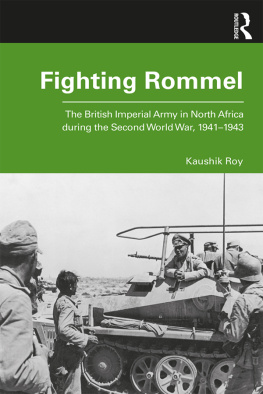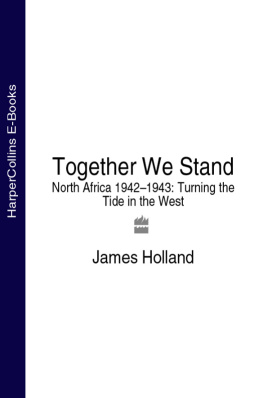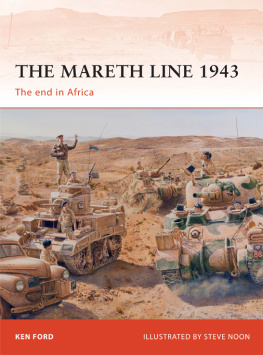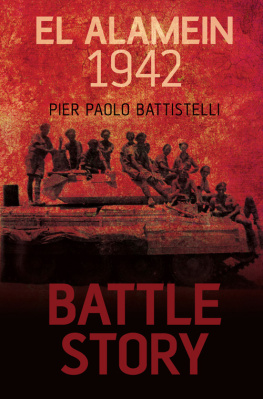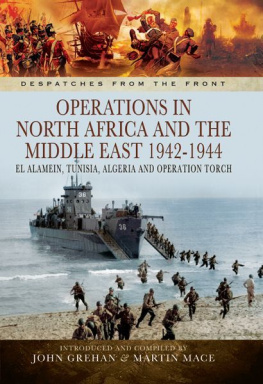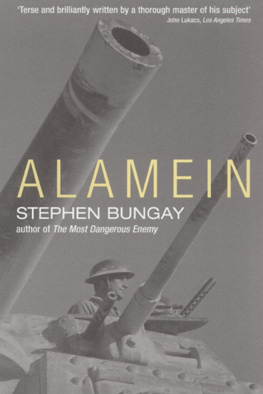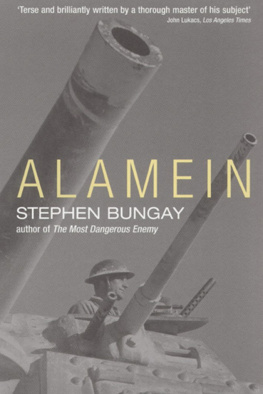
EUMENES Publishing 2019, all rights reserved. No part of this publication may be reproduced, stored in a retrieval system or transmitted by any means, electrical, mechanical or otherwise without the written permission of the copyright holder.
Publishers Note
Although in most cases we have retained the Authors original spelling and grammar to authentically reproduce the work of the Author and the original intent of such material, some additional notes and clarifications have been added for the modern readers benefit.
We have also made every effort to include all maps and illustrations of the original edition the limitations of formatting do not allow of including larger maps, we will upload as many of these maps as possible.
MIRACLE AT EL ALAMEIN
The Stunning Victory of Field Marshall Montgomery and the Allied Armies over General Rommels Afrika Korps
Richard McMillan
Miracle at El Alamein was originally published in 1943 as Mediterranean Assignment by Doubleday, Doran and Company, Inc.
* * *
To MONTY AND HIS MEN
TABLE OF CONTENTS
Contents
TABLE OF CONTENTS
REQUEST FROM THE PUBLISHER
Preface
Towards the end of June 1942, anyone able to see, as I saw, the 8 th Army arrive at the El Alamein line after its 300-mile retreat before Rommels Afrika Korps would not have gambled much on its chances of holding this gateway to the Nile Delta.
The Army had lost 70,000 men in prisoners, killed, and wounded. Its punch had gone. It had lost faith in its leaders. It was demoralized. It was hopeless and exhausted. After years in the desert, its only prospect, or so it seemed, was defeat and retreat, no matter how much the troops suffered or how well they fought.
In Cairo a general exodus of civilian and, to some extent, military population began. The fleet had left Alexandria. Everything pointed to a further withdrawal. Beyond doubt, that would have meant the loss of the Suez Canalof little strategic importance since the Mediterranean became closed to our shippingof Egypt and Palestine. The way, then, would be open to the oil wells of Persia and a link between the Axis and the Japanese somewhere east of the Euphrates.
The only barrier to the Nazi progression was the El Alamein linethat and the beaten 8 th Army. When the Army took over these positions, General Sir Archibald Wavell, the first desert victor, happened to be on a visit to Cairo. He told me at G.H.Q.:
I know the Alamein line well, because I happened to build it. I built it against the Italians when they reached Sidi Barrani in 1940. But it is far from complete. It requires a great deal of work to make it solid.
A defeated army and an incomplete line of defenses covering the approach to Alexandria and Cairo, distant only a few hours drive by carhow, with only these precariously slender supports, did we succeed in holding off and in throwing back the crack Afrika Korps legions, on the threshold of their most grandiloquent triumph?
This book tries to give the answer to that and other questions everyone is asking.
In searching for a title, I was tempted to call the book Miracle at Alamein. El Alamein meant to Egypt and, indeed, all Africa what Verdun symbolized for France in the most tragic days of World War L
But the story of the 8 th Army and its most brilliant recovery is not one but a whole series of miracles, closely related though separated by time and place. The miracles of Tobruk, of Malta, of the puny Western Desert Air Force, which grew from a fledgling to a mighty eagle, of the sorely battered eastern Mediterranean fleetall have a part in the plan of our desert victory.
The book deals with all the facets and aspects of the Mediterranean battle front and, above all, with the man who, in six months, changed the war map of the entire North African continent in our favor
General Sir Bernard Law Montgomery, the Desert Cromwell.
London, 1943
CHAPTER I Forty-eight Hours to Gibraltar
Apple-green seas hissed against the cruisers sides as the armada of warships swung through The Straits into the Mediterranean.
To port, the Rock of Gibraltar rose like a dark Sphinx with its back curving down into Spain, a few miles away. To starboard across the sparkling sea, a snuff-colored fringe of land marked where Africa and the desert beganthe desert to which I was heading, though I did not know it right then, on a long-term assignment for the United Press.
The assignment should have ended at Gibraltar. After the Battle of France and the Battle of Britain, I had shipped in a convoy from England on a tame missiona two-day visit to the Rock to write about its reinforced defenses and its preparedness to meet a drive by Hitler through Spain towards Africa. As it happened, I was not allowed to set foot on the Rock. Instead, I found myself catapulted into a warship and heading through the Mediterranean to keep a date with the enemy somewhere east of Gibraltarand a rendezvous with Rommel. That two-day time limit fixed by the authorities for my stay in Gib stretched out to two yearstwo years spent roaming the Mediterranean battle front, from Tsamuria to Tobruk, Crete to Capuzzo, and Albania to Alamein.
It was November 1940. In Europe the massed cannon waited, temporarily silenced, for the next master stroke of the Fhrer. For the time being, the Chancellor of the German Reich had all his attention divided between digesting his conquests in France and pursuing his dream of subduing Britain by aerial bombardment.
While the guns stood mute in Europe, they began to speak in the Balkans. Hitler and Mussolini had met in the Brenner Pass on October 4, and Il Duce had outlined to his Axis partner the plan of the Fascist plot against Greece. Mussolini proposed to browbeat the Greeks into ceding to Italy the province of Tsamuria, on the Albano-Greek frontier, as the first step in a series of annexations of Greek territory which would give Italy domination of both sides of the Adriatic and possibly also the Aegean Sea.
Hitler had not wholly approved. Il Duce, however, reminded him that Italy had not received satisfaction in his revindications against France for cession of Tunisia, Nice, Savoy, Corsica, and Djibouti, and argued that no danger of a Balkan war existed, as Metaxas would soon capitulate. So the Fhrer agreed.
The theory was all right, but the Greeks would not subscribe to it. They refused to be dragooned or blackmailed by their Black Shirt neighbors. They cherished their freedom with the same spirit of resolute independence as had Leonidas and Themistocles. Il Duce, whose battle slogan had become Woe to the weak! decided to teach them that tanks and guns, not history and culture, dictated the power of a modern nation. And so, once more the Balkans blazed.
Now it was Britains turn to strike, the first move in a carefully thought out plan of major strategy. Its object was to hit back at the underbelly of the Axis, to teach Mussolini that the war was far from won and to show him that the effete British Empire still packed a powerful punch and, unlike France, would go on fighting to the end.
Our voyage through the Mediterranean was the first phase of this long-term offensive, which was to culminate two and a half years later in Allied domination of the Mediterranean with the elimination of Rommel and the Afrika Korps from all Africa.


